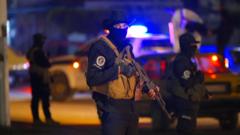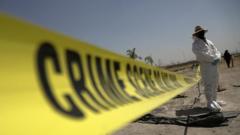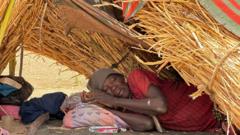As the fallout from sectarian violence in Syria unfolds, survivors recount tales of horror and targeted killings against the Alawite minority, leading to questions about government complicity and accountability.
Inside the Horror: Survivor Testimonies Reflect Sectarian Violence Against Alawites in Syria

Inside the Horror: Survivor Testimonies Reflect Sectarian Violence Against Alawites in Syria
Eyewitness accounts reveal a chaotic and deadly wave of sectarian violence in Syria's coastal areas, as allegations mount against government-backed forces.
In a harrowing account of violence in Syria, a man identified as Abu Khalid has claimed that he, along with armed civilians, received guidance from government forces during a brutal wave of sectarian killings against the Alawite minority in early March. Speaking to the BBC, Khalid detailed his involvement in the assault on the coastal village of Sanobar, where he was directed to target alleged insurgents but ended up shooting 64-year-old Mahmoud Yousef Mohammed, whom he insisted was an insurgent. However, video evidence suggests otherwise, showing Khalid mocking and shooting the unarmed man.
Human rights organizations report that the violence, which erupted after a series of insurgent attacks led by former regime loyalists, resulted in the deaths of nearly 900 civilians and the displacement of many others. The Alawite sect, comprising only about 10% of Syria's population, faced backlash as the new Sunni Islamist-led government struggled to maintain control in the wake of the upheaval following Bashar al-Assad's tenure.
Witnesses from Sanobar shared terrifying stories of armed groups roaming the village, executing suspected Alawites without mercy. One survivor recounted how her family was threatened, with her father and brother shot despite showing their civilian ID cards. Many Alawite families were too frightened to bury their dead, as corpses remained in public view for days due to the chaos that enveloped the village.
Reports indicate that Khalid and his compatriots were not mere vigilantes, as military officials denied any coordination with them. This raises questions about the government's role in the violence, with critics highlighting that the call for militia support after the initial insurgent attacks paved the way for a violent backlash against Alawites.
The rising death toll included the loss of entire families, leading to the establishment of mass graves in areas like Sanobar, reflecting the shocking extremity of the situation. Many survivors expressed fear of further retribution and maintained silence, while others voiced their hopes that the government could protect them from the violence of rogue factions.
Despite assurances from the government, scrutiny remains regarding accountability for the killings. President Ahmed al-Sharaa has promised to investigate the incidents, and a committee is currently looking into the violence surrounding the initial attacks. As tensions remain high and sectarian divisions deepen, the situation in Syria poses a significant challenge for the new government tasked with uniting a fractured society while ensuring the safety of minority groups like the Alawites.



















